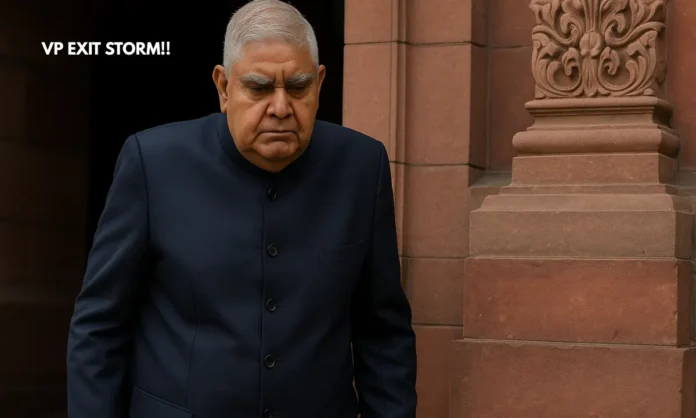Summary
- Dhankhar cites health reasons for stepping down but political undertones loom large.
- His unexpected resignation coincides with impeachment proceedings against Justice Yashwant Varma.
- The government must elect a new Vice-President within 60 days amid heightened political tensions.
A Sudden Exit That Raises More Questions Than Answers
Jagdeep Dhankhar’s resignation as India’s 14th Vice-President has set off intense speculation in Delhi’s power corridors. Officially, Dhankhar, 74, attributed his decision to health concerns, citing cardiac ailments and medical advice to slow down. Yet, the timing of his exit—on the opening day of the monsoon session and just hours after accepting a letter signed by 50 opposition MPs calling for Justice Yashwant Varma’s impeachment—has sparked conjecture about deeper political fissures.
Dhankhar’s recent meetings with Congress chief Mallikarjun Kharge and Delhi Chief Minister Arvind Kejriwal, coupled with his vocal push for reviving the National Judicial Appointments Commission (NJAC), were said to have irked the government. His unscheduled visit to Rashtrapati Bhavan to hand over his resignation caught even senior ministers off guard, prompting an emergency huddle led by Prime Minister Narendra Modi.
BREAKING: Vice President Jagdeep Dhankhar resigns without hint, message, or farewell.
— Manni (@ThadhaniManish_) July 22, 2025
President Droupadi Murmu ACCEPTS the resignation; PM Modi wishes him well.
A dignified exit—but why so sudden, so silent?
A statesman deserves more. 🇮🇳 pic.twitter.com/35RErBgqjj
Dhankhar’s Political Journey and Legacy
- Rose from Rajasthan’s Jhunjhunu district as a top advocate in the Supreme Court and High Courts.
- Served as a Janata Dal MP in the early 1990s, later joining BJP in 2003.
- Known for his combative tenure as West Bengal governor (2019–2022) before becoming Vice-President.
Dhankhar’s career trajectory—from farmer’s son to senior lawyer, politician, and eventually Vice-President—was marked by both resilience and controversy. His tenure as chairman of the Rajya Sabha witnessed intense confrontations with the opposition, often leading to accusations of partisanship. In December 2024, he faced an unprecedented impeachment motion from opposition MPs, which he described as a personal affront.
Political Implications and the Road Ahead
- The monsoon session is now overshadowed by Dhankhar’s resignation and the Justice Varma impeachment.
- Deputy chairman Harivansh will oversee Rajya Sabha proceedings until a new Vice-President is elected.
- The Election Commission must announce the poll schedule soon, with MPs from both houses voting via secret ballot.
Dhankhar’s exit could recalibrate parliamentary dynamics. While BJP holds the numbers, finding a consensus candidate with broad appeal will be crucial in the run-up to a session dominated by debates on Operation Sindoor and judicial accountability. His resignation may also embolden the opposition, which has already framed this as evidence of “growing cracks within the establishment.”
A Leadership Void at a Critical Juncture
Dhankhar’s departure leaves a vacuum in the constitutional hierarchy during a politically charged session of Parliament. His firm stance on judicial reforms, particularly the NJAC debate, suggests unresolved tensions with the government that go beyond personal health. As speculation swirls over who will replace him, the contest for the Vice-President’s post will likely emerge as a proxy battle for parliamentary influence.
The coming weeks promise high-stakes political maneuvering. For now, Dhankhar’s sudden exit is a reminder that, in Indian politics, timing often speaks louder than official statements.


